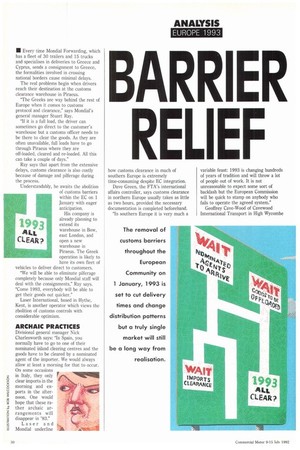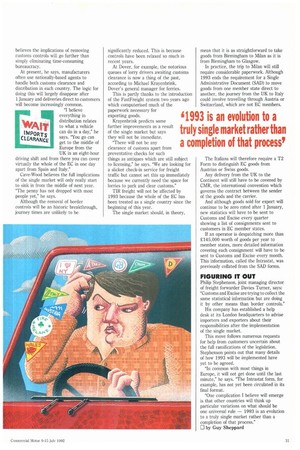BARRIER ELIEF
Page 32

Page 33

If you've noticed an error in this article please click here to report it so we can fix it.
in Every time Mondial Forwarding, which has a fleet of 30 trailers and 15 trucks and specialises in deliveries to Greece and Cyprus, sends a consignment to Greece, the formalities involved in crossing national borders cause minimal delays.
The real problems begin when drivers reach their destination at the customs clearance warehouse in Piraeus.
"The Greeks are way behind the rest of Europe when it comes to customs protocol and clearance," says Mondial's general manager Stuart Ray.
"If it is a full load, the driver can sometimes go direct to the customer's warehouse but a customs officer needs to be there to clear the goods. As they are often unavailable, full loads have to go through Piraeus where they are off-loaded, cleared and re-loaded. All this can take a couple of days."
Ray says that apart from the extensive delays, customs clearance is also costly because of damage and pilferage during the process.
Understandably, he awaits the abolition of customs barriers within the EC on 1 January with eager anticipation.
His company is already planning to extend its warehouse in Bow, east London, and open a new warehouse in Piraeus. The Greek operation is likely to have its own fleet of vehicles to deliver direct to customers.
"We will be able to eliminate pilferage completely because only Mondial staff will deal with the consignments," Ray says. "Come 1993, everybody Will be able to get their goods out quicker."
Laser International, based in Flythe, Kent, is another operator which views the abolition of customs controls with considerable optimism.
ARCHAIC PRACTICES Divisional general manager Nick Charlesworth says: "In Spain, you normally have to go to one of their nominated inland clearing centres and the goods have to be cleared by a nominated agent of the importer. We would always allow at least a morning for that to occur. On some occasions in Italy, they only clear imports in the morning and exports in the afternoon. One would hope that these rather archaic arrangements will disappear in '93."
Laser and Mondial underline believes the implications of removing customs controls will go further than simply eliminating time-consuming bureaucracy.
At present, he says, manufacturers often use nationally-based agents to handle both customs clearance and distribution in each country. The logic for doing this will largely disappear after 1 January and deliveries direct to customers will become increasingly common.
believe everything in distribution relates to what a vehicle can do in a day," he says. "You go can get to the middle of Europe from the UK in an eight-hour driving shift and from there you can cover virtually the whole of the EC in one day apart from Spain and Italy."
Cave-Wood believes the full implications of the single market will only really start to sink in from the middle of next year. "The penny has not dropped with most people yet," he says.
Although the removal of border controls will be an historic breakthrough, journey times are unlikely to be significantly reduced. This is because controls have been relaxed so much in recent years.
At Dover, for example, the notorious queues of lorry drivers awaiting customs clearance is now a thing of the past, according to Michael Krayenbrink, Dover's general manager for ferries.
This is partly thanks to the introduction of the FastFreight system two years ago which computerised much of the paperwork necessary for exporting goods.
Krayenbrink predicts some further improvements as a result of the single market but says they will not be immediate.
"There will not be any clearance of customs apart from preventative checks for such things as antiques which are still subject to licensing," he says. "We are looking for a slicker check-in service for freight traffic but cannot set this up immediately because we currently need the space for lorries to park and clear customs."
'FIR freight will not be affected by 1993 because the whole of the EC has been treated as a single country since the beginning of this year.
The single market should, in theory, mean that it is as straightforward to take goods from Birmingham to Milan as it is from Birmingham to Glasgow.
In practice, the trip to Milan will still require considerable paperwork. Although 1993 ends the requirement for a Single Administrative Document (SAD) to move goods from one member state direct to another, the journey from the UK to Italy could involve travelling through Austria or Switzerland, which are not EC members.
The Italians will therefore require a T2 Form to distinguish EC goods from Austrian or Swiss goods.
Any delivery from the UK to the Continent will still have to be covered by CMR, the international convention which governs the contract between the sender of the goods and the carrier.
And although goods sold for export will continue to be zero rated after 1 January, new statistics will have to be sent to Customs and Excise every quarter showing a list of consignments sent to customers in EC member states.
If an operator is despatching more than £145,000 worth of goods per year to member states, more detailed information covering each consignment will have to be sent to Customs and Excise every month. This information, called the Intrastat, was previously collated from the SAD forms.
FIGURING IT OUT
Philip Stephenson, joint managing director of freight forwarder Davies Turner, says: "Customs and Excise are trying to collect the same statistical information but are doing it by other means than border controls."
His company has established a help desk at its London headquarters to advise importers and exporters about their responsibilities after the implementation of the single market.
This move follows numerous requests for help from customers uncertain about the full ramifications of the legislation. Stephenson points out that many details of how 1993 will be implemented have yet to be agreed.
"In common with most things in Europe, it will not get done until the last minute," he says. "The Intrastat form, for example, has not yet been circulated in its final format.
"One complication I believe will emerge is that other countries will think up particular variations on what should be one universal rule — 1993 is an evolution to a truly single market rather than a completion of that process."
by Guy Sheppard












































































